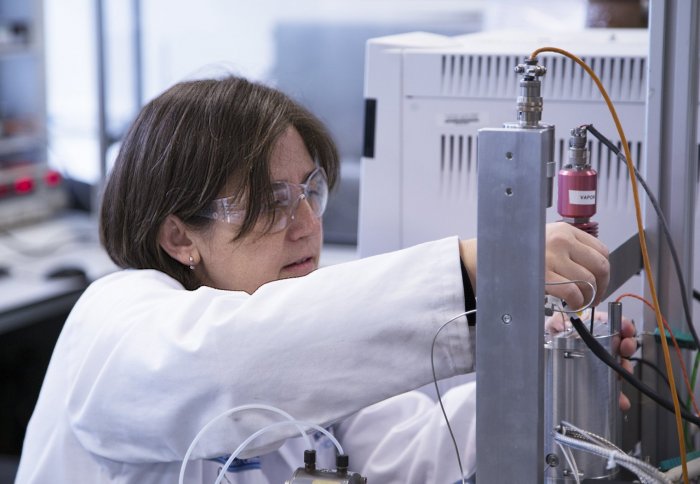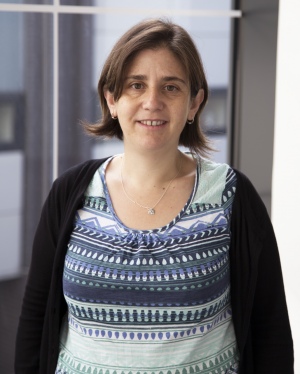Imperial engineer inspires the next generation of women in STEM

We spoke to Dr Yolanda Sanchez-Vicente about her work mentoring secondary school students as a STEM Ambassador for CREST.
Dr Sanchez-Vicente is a Research Fellow in the Department of Chemical Engineering whose research is primarily focused on carbon capture and storage processes.
Can you tell us a bit more about yourself and your career in engineering to date?
I studied Chemical Engineering in Spain, and completed my PhD at the University Complutense of Madrid. I have always been interested in research, so I continued my career as a postdoc, and then undertook a junior fellowship. This gave me the opportunity to start becoming more independent in my work. After this, I applied for a research fellow position here at Imperial, and I currently work within the QCCSRC (Qatar Carbonates and Carbon Storage Research Centre).
How did you get involved with mentoring secondary school students as a STEM Ambassador for CREST?
I think you need to do whatever you can to broaden the horizons of students at this age, and to help them see where a science education could take them.
– Dr Yolanda Sanchez-Vicente
Research Fellow
I received an e-mail about the CREST mentoring scheme, and was keen to participate. The aim of the programme is to introduce young people to the world of research, and to guide them in developing their own projects and ideas.
I was asked to help out with a project designed by two secondary school students that focused on trying to produce electricity from bacteria. I met with them to discuss their ideas, and how they could set up an apparatus using the facilities available to them at their school.
The two girls I worked with were very passionate about the project in the beginning, but were slightly disheartened when they realised that they couldn’t create a huge amount of electricity with their modest setup! I thought that by inviting them to Imperial, I could help to keep that initial spark of interest going.
The students came to the Department [of Chemical Engineering], and I introduced them to the professors, showed them the labs and facilities such as the Carbon Capture Pilot Plant, and they were really impressed. After that, they were able to finish and submit their project, which many of the students on the CREST scheme were not able to do.
I hope that the experience has inspired them to continue studying science, and perhaps even pursue a career in it in the future. I think you need to do whatever you can to broaden the horizons of students at this age, and to help them see where a science education could take them.
What was it that made you want to work specifically with secondary school students?

Dr Yolanda Sanchez-Vicente
I wanted to be involved in this project for a number of reasons, namely because I am passionate about research, but also because I have had really positive experiences of mentoring in the past. When I started out as a postdoc here at Imperial, I helped to supervise a secondary school student who came to work in our group for six months, which was great. At this age, students have a natural enthusiasm and passion for learning, which is really wonderful to see. It’s a very rewarding thing to be a part of.
In the context of your recent mentoring experience, why do you think it is important to encourage female students to pursue further study in science and/or engineering?
I think diversifying engineering is really important, because different kinds of people can contribute to research in different ways. I currently have two female master’s students working with me who are brilliant. I think it’s really important to encourage women at this stage to carry on with their research so that we can make the most of the skills that they have. However, much earlier on in education, I think a lot of young women and girls don’t even consider a career in engineering as an option, because they don’t think they are capable.
That’s why I think it was really important for the girls I was working with as part of the mentoring scheme to have such a positive experience of seeing a project through from start to finish. I think it has the potential to inspire them to go further.
Why do you think young women are deterred from pursuing STEM-related careers?
At the end of the day, if this is what you feel that you should be doing with your life, then you should do it.
– Dr Yolanda Sanchez-Vicente
Research Fellow
I think it is mostly to do with the society and culture in which we live. For all women, but particularly teenage girls, there is a lot of pressure to be perfect. They hold themselves to very high standards, and are often quick to think that they are not good enough in certain subjects at school – such as maths or science – even if they enjoy studying them. This will then influence the choices they make later on in life.
I also think that more needs to be done by lecturers to encourage female students to stay on, because they generally don’t have as much confidence in their work as male students, even if they are attaining better grades.
Did you have any role models or mentors who encouraged you at the beginning of your career?
Early on in life, I grew up surrounded by strong and independent women. My mother, my aunt and my grandmother had to do everything on their own; they developed their careers and raised their families by themselves. I think that this has in turn made me a much more independent person, which lends itself to a career in research.
What advice would you give to a female student who is considering pursuing a career in engineering?
I would tell them to not give up, and that they should continue even if sometimes it feels as though they don’t have enough support or guidance.
I found that when I started out in my career, I had plenty of female colleagues. Now, at my current level, I’ve found that there aren’t so many. A lot of my peers started their PhD at the same time as me, but didn’t continue down the research path because of the nature of the work – postdoc positions are almost always fixed-term, or require you to relocate. This is a very off-putting prospect if you want to have a family. However, there are always ways of balancing your family and your career. In fact, there are plenty of women here at Imperial right now who are doing just that.
At the end of the day, if this is what you feel that you should be doing with your life, then you should do it.
If you are based at Imperial College London and would like to find out more about mentoring with CREST, visit the Imperial CREST Academy website, or contact Dr Cecilia Johansson.
Article text (excluding photos or graphics) © Imperial College London.
Photos and graphics subject to third party copyright used with permission or © Imperial College London.
Reporter
Ms Genevieve Timmins
Academic Services